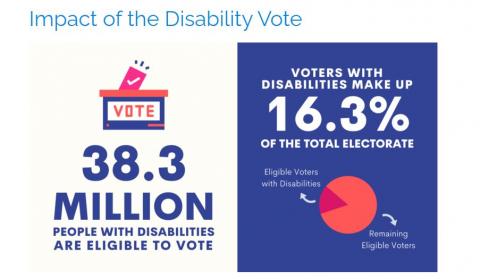Gubernatorial Town Hall Unites Disability Community
Our lives begin to end the day we become silent about things that matter.
– Martin Luther King Jr.
In the United States, the disability community is 61 million people strong. Disability cuts across gender, race, religion, sexual orientation, and age. Over 38 million people with disabilities are eligible to vote—that is nearly one out of every six voters. The best way to make changes in our communities is to let the candidates know what is important to us, educate ourselves about the issues, and vote!

The Gubernatorial Candidates Town Hall on Disability and Chronic Conditions was a huge undertaking. It was held at Girls at Work, Inc. in Manchester, NH, and was co-sponsored by nine nonprofits and advocacy groups. With nearly 200 people in attendance, the event was presented both virtually and in person to maximize accessibility and participation. Governor Chris Sununu and Senator Tom Sherman were asked to talk about their disability policy platforms and visions for New Hampshire. Each candidate was invited to speak on topics from workforce shortages, education, and housing to transportation and employment.
I was asked to attend the Town Hall and was excited about participating; but to be honest, I was a little disappointed when I heard that Governor Sununu and Senator Sherman would not be sharing the stage and debating the issues. I love a little spirited “back and forth” because I like to be presented with both sides of an issue. On the other hand, I didn’t realize how exciting it would be to be in the same space with so many of my friends and colleagues whom I hadn’t seen in person for over two years due to the pandemic. It made me feel strong because we were there together talking about the right to live in the community and be happy, contributing citizens. Disability issues are not usually brought up during elections, and now, at least, our issues would be on the table.
Two weeks before the Town Hall, the nonprofits and advocacy groups who were hosting the event collaborated on three questions and presented them to the candidates. Having the questions in advance allowed Senator Sherman and Governor Sununu enough time to reflect and prepare thoughtful responses. The questions were well-drafted because they addressed our most significant needs.
Question One: People with disabilities want to live fully inclusive lives in their communities. To avoid placement in a nursing home or an institutional setting—in-state or out-of-state—people with disabilities need access to home and community-based support services. What are your plans to increase the workforce serving the home and community-based system for people with disabilities (i.e., paraprofessionals, personal care attendants, direct support professionals, and nurses)?
Question Two: Through Education Freedom Accounts (EFAs), millions of dollars are moving from local public schools into private schools which are not legally bound to follow IDEA [Individuals with Disabilities Education Act], and some are also permitted to deny enrollment to students with disabilities. This type of financial loss places pressure on local school districts that must deliver special education services. How will you ensure that special education students will receive an equitable and inclusive education in the age of EFA’s diminishing public school budgets?
Question Three: Considering the shortage of affordable housing in the state of New Hampshire—especially accessible housing—what, in your role as governor, will you do to ensure that people with disabilities have access to affordable community-based accessible housing so that people with disabilities are able to live meaningful lives in their communities? What is the role of state government in this effort?
From Where I Sit…
My favorite part of the Gubernatorial Candidates Town Hall was that we— the disabled community—were united and spoke with one voice. This has not always been the case. We do not always think or advocate in a cross-disability way. For instance, people who are elderly may not identify as disabled, even though they use a cane or a wheelchair to get around. Another example would be if someone with a physical disability does not want to be associated with someone who has a cognitive disability because they are afraid of also being labeled as cognitively disabled. Since we all have the same basic needs, we should advocate together. I did not feel that there was any of this disability-related prejudice or stigma at this event. It made me feel strong and proud.
Everyone wants to live a good life. To me, this is a life with lots of choices and opportunities, rich relationships, and valued roles in the community. For all of us, this can’t be achieved without good support. For those of us who experience disabilities or chronic conditions, living the life of our choosing requires advocacy. Educating ourselves and our policymakers and speaking up about issues that matter to all of us are necessary parts of living up to our civic duty. Please don’t give away your civil rights by choosing not to vote. Others who came before us fought hard for that right.
For voting information specific to people with disabilities, check out the voter toolkit below, and don’t forget to vote on November 8th.
Watch the “Gubernatorial Candidates Town Hall on Disability and Chronic Conditions”
“Know Your Voting Rights: A Toolkit for Voters with Disabilities”